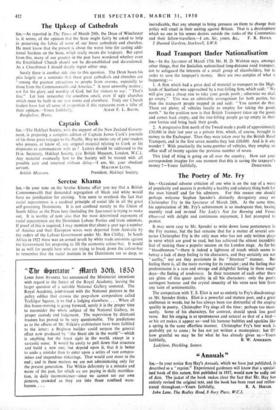The Poetry of Mr. Fry
SIR,—Occasional adverse criticism of one who is on the top of a wave of popularity and success is probably a healthy and salutary thing both for the man himself and for his admirers. For this reason one should perhaps welcome Stephen Spender's distinctly derogatory essay on Christopher Fry in the Spectator of March 24th. At the same time, his appreciation of Mr. Fry's achievement is so inadequate that, having recently read and re-read The Lady's Not for Burning and Venus Observed with delight and continuous enjoyment, I feel prompted to protest.
It may seem easy to Mr. Spender to write down loose pentameters in the Fry manner, but the fact remains that for a matter of several cen- turies Christopher Fry is the only man who• has not only written 'plays in verse which are good to read, but has achieved the almost incredible feat of making these a popular success on the London stage. As for his " bloodlessness "—there is indeed a lightness of touch which seems to betray a lack of deep feeling in his characters, and they certainly are not " earthy," nor are they passionate in the " Streetcar " manner. But feeling there is, all the more moving for its restraint ; and the feeling that predominates is a rare and strange and delightful feeling in these tough days—the feeling of tenderness. In their treatment of each other there are glints of this queer quality its all his characters: only the poet's astringent humour and the crystal sincerity of his verse save him from any taint of sentimentality.
The comparison with. T. S. Eliot is not so entirely to Fry's disadvantage as Mr. Spender thinks. Eliot is a powerful and mature poet, and a great craftsman in words, but he has always been too distrustful of the singing quality in poetry. Christopher Fry sings all the time: perhaps too inces- santly. Some of his charactets, for contrast, should speak less good verse. But his singing is as spontaneous and natural as that of a bird— or his art makes it appear so—and his humour bubbles and sparkles like a spring in the same effortless manner. Christopher Fry's best work is probably yet to come ; he has not yet written a masterpiece: but 0! how grateful we may be for what he has already given us.—Yours






































 Previous page
Previous page